
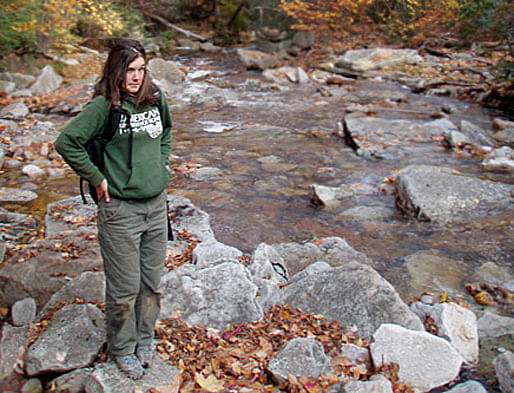
Working out of the Box is a series of features presenting architects who have applied their architecture backgrounds to alternative career paths.
Are you an architect working out of the box? Do you know of someone that has changed careers and has an interesting story to share? If you would like to suggest an (ex-)architect, please send us a message.
Archinect: Where did you study architecture?
Kim Knollenberg: My first official study of architecture was at the University of Miami. They hold a High School Summer program where I spent 3 weeks during the summer before my junior year learning about studio culture, theory, history and Miami. I then went on to study architecture formally at Philadelphia University in Philly.
At what point in your life did you decide to pursue architecture?
KK: I remember it clearly. 7th grade. An architect came into class one day and popped in a VHS of Batman Returns. As Michael Keaton rolled through the streets of Gotham, our guest highlighted the grand architecture of the city. I was sold.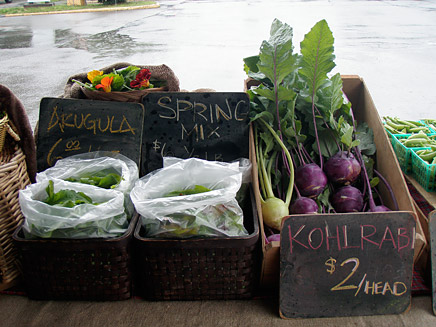
↑ Click image to enlarge
Fresh, seasonal, organic produce
↑ Click image to enlarge
↑ Click image to enlarge
When did you decide to stop pursuing architecture? Why?
KK: About two years ago I was managing a doozy of a project. It was the perfect learning environment for a young architect. There had already been a few firms in charge ahead of ours, we were brought in to do interior architecture for two major programatic pieces of the whole, and soon we were put in the driver’s seat for the entire project. I was lucky enough to literally live on site three to four days a week for about 4 months during construction. I was up every morning with they guys with tools, working through today’s major problems and putting out fires by the hour. I loved it.
When the project ended and I was back in front CAD every day, I realized how much I missed that kind of work: real-time problem solving and being able to touch the things you were ‘producing’ on paper.
I also realized how disconnected I was, working as an architect, from people , communities. I wanted to be a vital part of a community on a ‘hold it in your hand’ level. So I looked into what my other passions were and how I could fulfill my desire to connect, and stumbled into farming.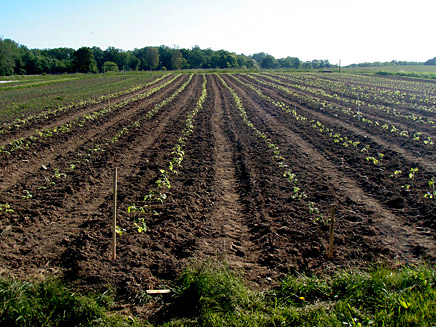
↑ Click image to enlarge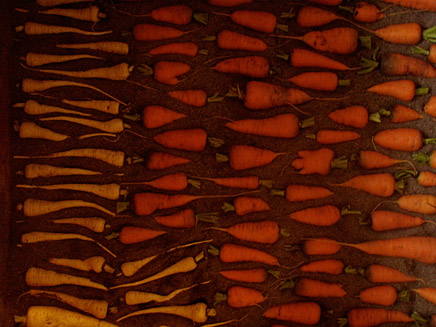
↑ Click image to enlarge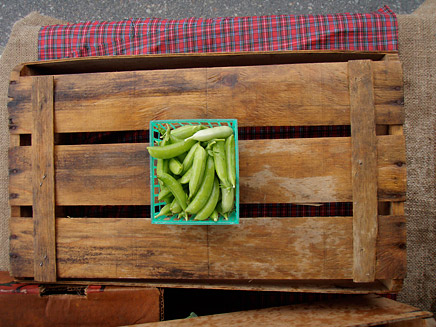
↑ Click image to enlarge
Describe your current profession.
KK: Wow. Where to start? I get to grow food, real food. For people, real people.
It is amazing, exhausting, inspiring, satisfying, dirty, hot, wet, smelly, beautiful, bloody, green, yellow, blue, red, orange, purple, white, sweet, bitter, juicy, muddy, dusty, funny, gross, sad, did I say amazing?
After two seasons at two great farms in the Hudson Valley (Common Ground Farm in Wappingers Falls and Four Winds Farm in Gardiner), I kept creeping north and have settled in as the Farm Manager at The Community School CSA in Tamworth, NH.
The CSA experience at Common Ground paired with Four Winds’ NO-TILL practices have given me a wealth of knowledge to prepare me to work here in New Hampshire. I am really excited to be growing for not only a school, but for a community of people who are stoked about fresh, organic, seasonal food.
While I’m doling out websites here, I should mention my blog . It has been my sounding board for this transition. Though I had to leave it for a while (no internet connection), it is back up and happy. It will soon also become a season food recipe outlet for the CSA.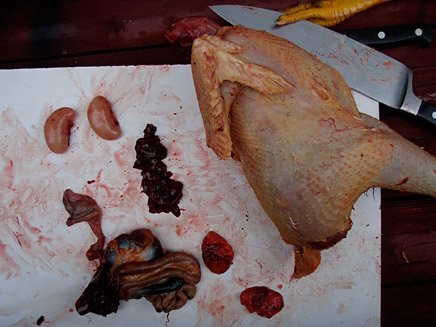
↑ Click image to enlarge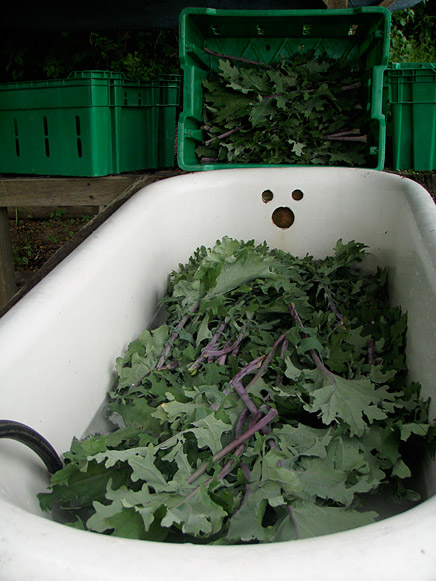
↑ Click image to enlarge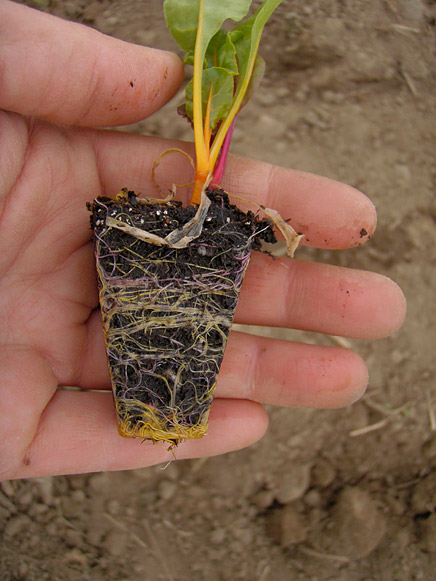
↑ Click image to enlarge
What skills did you gain from architecture school, or working in the architecture industry, that have contributed to your success in your current career?
KK: It’s funny, there is a quote that hangs on my fridge that reads "Some people tell me that I’m wasting my college education, but to be a good farmer, you have to be a scientist, a mechanic, a businessman." I think I could add a running list to what else you have to be: an architect, a plumber, an electrician, a counselor, a nutritionist, a chef... My first project, I think day 3 of being at Common Ground, mid April, I set to work on turning a rotting manure spreader into a mobile chicken coup. My design skills and knowledge of construction (albeit mostly in theory aside from some Habitat For Humanity work) were a major asset for this project, and other projects that followed, and will surely continue to follow.
Alternatively, I tell people "If you don’t know what you want to be [and you can afford it], go to architecture school!" I really feel that architecture school taught me how to think. How to problem solve. How to work with others. How to confidently work alone. How to speak and relate to people. (If standing up before a panel of critics with your heart and sole pinned to the wall behind you doesn’t teach you how to speak, have confidence, think on your feet, or relate to others... nothing will.)
↑ Click image to enlarge
How to turn a rotting manure spreader into a mobile chicken coup: Step #1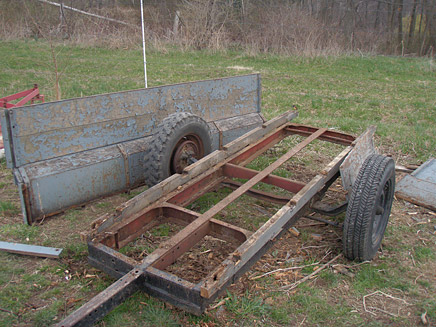
↑ Click image to enlarge
Step #2
↑ Click image to enlarge
Step #3
↑ Click image to enlarge
Step #4
Do you have an interest in returning to architecture?
KK: Is my mom reading this?
I’m not sure. I feel as though I now have the skill set to produce vital things for human life: shelter and food. They [farming and architecture] go hand-in-hand. So, yeah, I think that somehow the two halves of my life will somehow re-join. But not without being affected by each other. I could never truly walk away from architecture. It is part of me and I love it. Nor could I now walk away from farming and back into architecture (and definitely not back into an office!)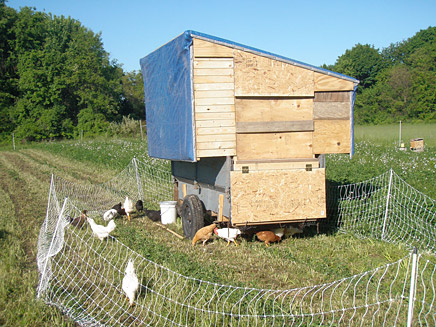
↑ Click image to enlarge
Voilà - the finished mobile chicken coup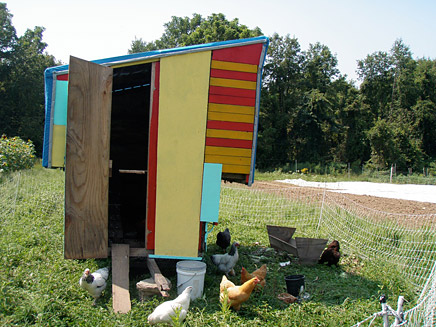
↑ Click image to enlarge
↑ Click image to enlarge
Creative Commons License
This work is licensed under a Creative Commons License .
/Creative Commons License
11 Comments
Great stuff! My favorite line: I tell people "If you don’t know what you want to be [and you can afford it], go to architecture school!"—So true.
very nice. inspiring too. thanks, archinect
This makes me feel better for similarly diverging.
Loved this interview, and nice to see the WOOTB feature return!
Architect-turned-chicken-keepers unite! I swear something about carrying a bucket of water for the chicks is completely unquestionable, while pretty much every aspect of the architecture I practice is. Not that I don't love being an architect, but the direct relationship between labor and success in farming is very attractive.
That photo of the carrots is also beautiful.
Where is tumbles?!
Like architecture, your work is dedicated to building healthy, strong bodies. You are a social architect.Good luck with your bright future, in an area that is much welcomed and needed.
Agree with Donna, those images are super pretty!
the chicken coop is the new doghouse according to Sunset magazine. and they are never wrong in trendforecasting. i enjoyed this!
Kim,
The interview was informative and the images were exceptional. The tremendous passion that you bring to the work arena is awesome and that is one lucky community for it. Look forward to future postings.
Kim,
I never thought you'd become a farmer; then again, you always were pretty earthy. Glad that you're happy. And those images are amazing. Good luck to you.
PhilaU Class of '06
I can totally relate to this. I am in Nicaragua as a project manager for the La Joya Eco Community development and in that experience have learned how to grow papaya, mangos, plantains, and many other tropical fruits as well as working with a biointensive farm plot to grow super veggies! One day I am turning compost and the next finalizing the design of a bamboo structure we are using for a scenic overlook. It is true what you mention about the development of problem solving skills and I could never be fully stimulated in any other profession.
Hello, I'm Noorul Habeeb from India, currently based in Dubai.. I'm an Architect and I'm looking for taking up Organic Farming.. Or, bridging Landscape Architecture and Organic Farming.. I still love this field.. But, it always makes me feel bad that we exploit all the natural resource and plough fields are being built.. Green buildings and sustainable buildings have come.. But, that's not gonna produce food for living.. We exploit all the plough fields and construct a green building over it.. Does it make sense..? Yes, we need buildings to live.. But, we come across many buildings which are built and have hardly been used.. It could sound funny, but this is what runs in my mind always.. And Organic Farming is a huge field from cultivation to Poultry, Dairy etc.. I have seen a farmer next to my block in my University having a plough field.. Inside the campus.. He used to come in a bullock cart to water it.. He refused to give his piece of land to the University, where others gave and left.. I don't know if they blackmailed or gave a fancy price to him, his land is no longer there and that space has become a car park now.. What are we going to eat if all the plough fields are depleted..? What are we going to give our future generations..?? It deeply saddens me regarding the climate change and the global warming we face right now.. I have a responsibility to plant as many trees as possible.. And the sad forceful situation of consuming artifical and preserved food, and the consequences we face now(early diabetes, cancer etc).. These all make me to look up for Organic Farming.. Give me your valuable suggestions and guidance.. Thank you
Block this user
Are you sure you want to block this user and hide all related comments throughout the site?
Archinect
This is your first comment on Archinect. Your comment will be visible once approved.